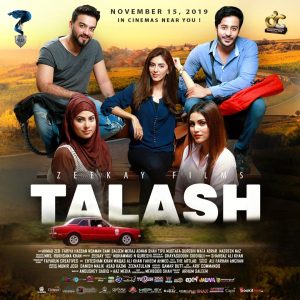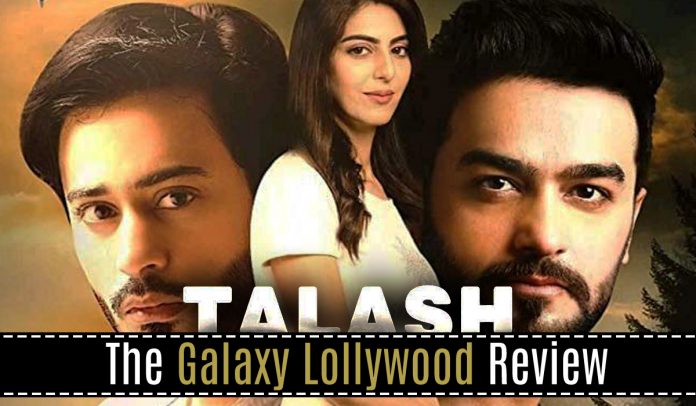Film: Talash
Release Date: November 15, 2019
Director: Zeekay
Review by: Faisal Ali H
Handling a film with an important underlying social theme is always a tricky business. It is difficult to strike the right balance between entertainment and social messaging, and when it comes to commercial cinema filmmakers usually try to keep depiction of such issues at the core of the plot, or perhaps as its important corollary. Note that I use the words ‘core’ and ‘plot’ here – it is absolutely critical for a film to have an engaging plot and also for the social issue discussed to not completely overpower and overwhelm it. If this happens, the final product morphs into a very in-your-face piece of public service message, which is what happens with Talash.
That is not to say all is lost when it comes to the film. Let’s take a look…
The Good
The film starts off promisingly enough with a bunch of young doctors played by Fariya Hassan, Ahmed Zeb, and Wafa Abrar who head off to Tharparkar to set up camp for kids suffering from malnutrition. On their way, they encounter a host of characters played by Saleem Mairaj (as a slow-witted wadera), Adnan Shah Tipu and Mustapha Qureishi, who makes his larger than life presence felt in the avatar of the elder wadera. The production quality here is quite decent – the photography captures the semi-arid environs of interior Sindh rather well, and the music – both the background and the OST is actually quite good. The only song-and-dance sequence in the film is well put together, too, and puts many commercial ventures who attempt the same to shame by incorporating the local culture really well.
 Another of the film’s plus points is the performance put in by the lead and supporting cast members. Fariya Hassan and Ahmed Zeb are quite good, with Fariya giving the right filmi vibes. The two are promising talents to watch out for. And of course, the legendary Mustapha Qureishi completely steals the limelight whenever he enters the frame; his presence is one of the film’s redeeming qualities. One wonders why Pakistani cinema has not more effectively been able to use his talents in the past.
Another of the film’s plus points is the performance put in by the lead and supporting cast members. Fariya Hassan and Ahmed Zeb are quite good, with Fariya giving the right filmi vibes. The two are promising talents to watch out for. And of course, the legendary Mustapha Qureishi completely steals the limelight whenever he enters the frame; his presence is one of the film’s redeeming qualities. One wonders why Pakistani cinema has not more effectively been able to use his talents in the past.
The film also attempts to create comic situations based on the issue it attempts to drill down your head – that of childhood malnutrition. Often, the lead pair encounter people in the village behaving somewhat strangely – which the film suggests is linked to poor mental development resulting from malnutrition. While this may seem like a good idea on paper and works in one or two instances, it brings us to one of the issues with the film…
The Bad
There are serious tonal problems with Talash. Often, the film strikes a discordant chord by inserting a comic angle into some very serious and disturbing scenes. Eventually, the back and forth switch between comedy and serious themes becomes jarring. And then there are problems with inappropriate messaging. For example, the scene where men at the dhabba are gawking and ogling at Fariya Hassan’s character had comic music playing in the background – one was not sure what to make of this. Worse, when Fariya gets kidnapped towards the end of the film, her boss makes a ridiculous joke and the movie once again veers into the wrong zone by treating the entire situation lightheartedly.
Moreover, Talash is way too long – for a narrative with a threadbare plot to be stretched to well over two hours is testing the audience’s endurance to a limit.
The Ugly
The main problem with Talash has to be its screenplay and script. Every possible social issue – from underage marriages, lack of drinking water, physical abuse of children, to the importance of breastfeeding infants within a certain timeframe after birth etc. – is rubbed into the audience’s face without any care or regard for being woven with some degree of finesse or subtlety into the film’s plot. Almost every single scene deals with one of the aforementioned issues, and you are left confused about whether you just paid to watch extended public service infomercial.
Also, when it comes to the plot, the film takes way too many liberties. For example, heading off to Tharparkar, our lead pair takes a random detour to land in a village, where guess what, Tania (Fariya Hassan) also finds her former boyfriend who she has been searching for, which is one of the film’s subplot. It’s all too convenient and takes away from any plausibility.
To cut to the chase
To be sure, Talash deals with the critically important social problem of childhood malnutrition that afflicts a large portion of infants in the country, and the developing world at large. With this timely and relevant topic, it fares somewhat okay as an extended public-service infomercial, however as a movie it falters. The film has some decent performances, music and production values which at least ensure that it is not an outright washout, but that is really about it.
Rating: 2/5 stars




